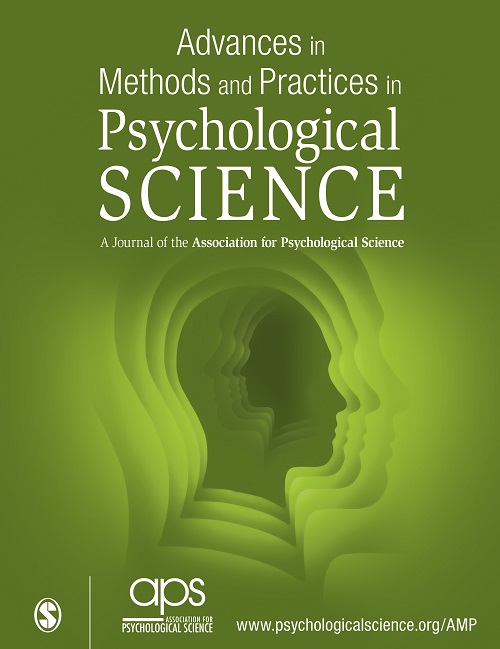Citation Patterns Following a Strongly Contradictory Replication Result: Four Case Studies From Psychology
IF 15.6
1区 心理学
Q1 PSYCHOLOGY
Advances in Methods and Practices in Psychological Science
Pub Date : 2021-02-09
DOI:10.1177/25152459211040837
引用次数: 15
Abstract
Replication studies that contradict prior findings may facilitate scientific self-correction by triggering a reappraisal of the original studies; however, the research community’s response to replication results has not been studied systematically. One approach for gauging responses to replication results is to examine how they affect citations to original studies. In this study, we explored postreplication citation patterns in the context of four prominent multilaboratory replication attempts published in the field of psychology that strongly contradicted and outweighed prior findings. Generally, we observed a small postreplication decline in the number of favorable citations and a small increase in unfavorable citations. This indicates only modest corrective effects and implies considerable perpetuation of belief in the original findings. Replication results that strongly contradict an original finding do not necessarily nullify its credibility; however, one might at least expect the replication results to be acknowledged and explicitly debated in subsequent literature. By contrast, we found substantial citation bias: The majority of articles citing the original studies neglected to cite relevant replication results. Of those articles that did cite the replication but continued to cite the original study favorably, approximately half offered an explicit defense of the original study. Our findings suggest that even replication results that strongly contradict original findings do not necessarily prompt a corrective response from the research community.引用模式遵循强烈矛盾的复制结果:来自心理学的四个案例研究
与先前研究结果相矛盾的重复性研究可能会引发对原始研究的重新评估,从而促进科学自我纠正;然而,研究界对重复性结果的反应尚未得到系统的研究。衡量对复制结果的反应的一种方法是检查它们如何影响对原始研究的引用。在这项研究中,我们在心理学领域发表的四篇著名的多实验室复制论文中探索了复制后的引用模式,这些论文与先前的研究结果强烈矛盾。一般来说,我们观察到有利引用的数量在复制后略有下降,而不利引用的数量略有增加。这表明只有适度的纠正效果,并意味着对原始发现的相当持久的信念。与原始发现强烈矛盾的重复结果不一定会使其可信度无效;然而,人们至少可以期望复制结果在随后的文献中得到承认和明确的辩论。相比之下,我们发现了大量的引用偏倚:大多数引用原始研究的文章忽略了引用相关的复制结果。在那些引用了重复实验但继续引用原始研究的文章中,大约一半的文章为原始研究提供了明确的辩护。我们的研究结果表明,即使是与原始研究结果强烈矛盾的复制结果,也不一定会引起研究界的纠正反应。
本文章由计算机程序翻译,如有差异,请以英文原文为准。
求助全文
约1分钟内获得全文
求助全文
来源期刊
CiteScore
21.20
自引率
0.70%
发文量
16
期刊介绍:
In 2021, Advances in Methods and Practices in Psychological Science will undergo a transition to become an open access journal. This journal focuses on publishing innovative developments in research methods, practices, and conduct within the field of psychological science. It embraces a wide range of areas and topics and encourages the integration of methodological and analytical questions.
The aim of AMPPS is to bring the latest methodological advances to researchers from various disciplines, even those who are not methodological experts. Therefore, the journal seeks submissions that are accessible to readers with different research interests and that represent the diverse research trends within the field of psychological science.
The types of content that AMPPS welcomes include articles that communicate advancements in methods, practices, and metascience, as well as empirical scientific best practices. Additionally, tutorials, commentaries, and simulation studies on new techniques and research tools are encouraged. The journal also aims to publish papers that bring advances from specialized subfields to a broader audience. Lastly, AMPPS accepts Registered Replication Reports, which focus on replicating important findings from previously published studies.
Overall, the transition of Advances in Methods and Practices in Psychological Science to an open access journal aims to increase accessibility and promote the dissemination of new developments in research methods and practices within the field of psychological science.

 求助内容:
求助内容: 应助结果提醒方式:
应助结果提醒方式:


